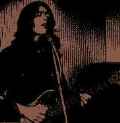 The Doobie Brothers / Rory Gallagher
The Doobie Brothers / Rory Gallagher concert held at the Roanoke Civic Center
 The Doobie Brothers / Rory Gallagher
The Doobie Brothers / Rory Gallagher  He is standing over a table of food. The
light is gray, the room barren.
He is standing over a table of food. The
light is gray, the room barren.|
Mailing & Discussion List  |
|
|
|
|
|
|
| Forward to next article |